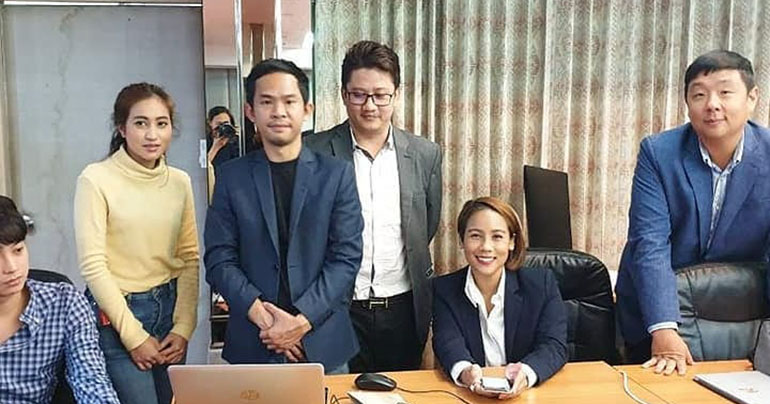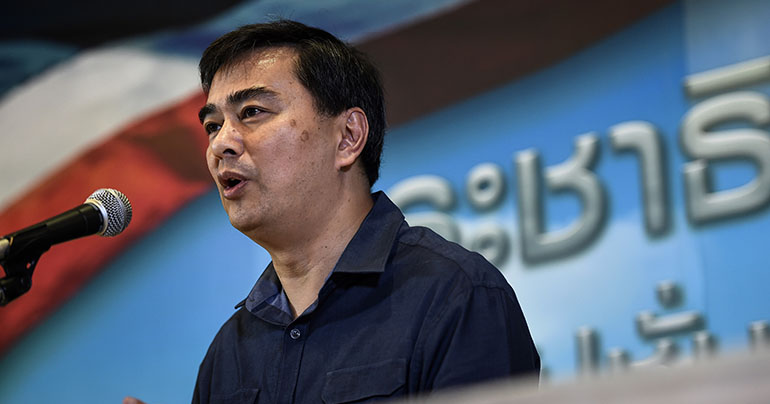The video is set in black and white. A group of rappers take turns criticising the Thai government, military and general get-rich attitude of society. In a country known for its dismal record of cracking down on political artistic expression under the current rule by the military junta, the rappers spit lyrics directly aimed at the authorities: “The country that both sides fear the army / Four years already, motherfucker, still no election / Free country? Fuck it! Don’t tell me I can choose / Even the PM is still picked by the army.”
The viral Thai rap song “Prathet Ku Mee” released by the group Rap Against Dictatorship in late October has more than 50 million views on YouTube, more than half the population of Thailand. Its popularity apparently shielded the group from what appeared to be imminent punishment from the government, yet the group disabled the comment section in order to avoid more trouble. The junta could have also prevented access of Thai viewers to the video by blocking access to YouTube. It would have been an extreme measure, but it was theoretically possible.
Then a recent development made it virtually impossible to shut it out.
A new permanency
On 26 October, someone stored a link to the video in a transaction of the cryptocurrency ZCoin. Cryptocurrencies use blockchain technology, which is essentially an online system of recording transactions simultaneously on multiple computers using what’s called “blocks”. Because it’s recoded in many places, it can never be entirely removed – even by the person who initiated the transaction. Through block number 111089, the Thai rap video is now visible to anyone, anywhere.
Marc Rocas, a board member of the non-profit association Blockchain Catalunya, said that information in the blockchain cannot be deleted while the network is running: “In order to shut down a blockchain network, you have to shut down all the devices, all the servers, all the computers that are running this blockchain.”
Block number 111089 carries only a link to the video, which is actually stored on the InterPlanetary File System (IPFS). IPFS acts as a type of alternate internet where content is not centrally stored, just as blockchain is stored on many computers. This means that, in order to fully remove the video, authorities would need to shut down all servers containing the blockchain as well as all servers containing the IPFS.
“This is a new step for the pro-democracy [movement] to go one step ahead of the conservative process in Thailand,” said Pavin Chachavalpongpun, an associate professor at Kyoto University. “So my opinion is that the battlefield has moved away now from street protests – now it [has] moved into cyberspace.”

The junta, he added, “still rely on mainstream media… And then they still believe that they can control information top-down. They are so old-fashioned…. I think this is a great leap forward, and I don’t know how the state would cope with that.”
The identity of the person who posted the video link is unknown. Part of the appeal of cryptocurrencies is that those involved in transactions are anonymous. But many, including the popular Bitcoin, are in fact pseudo anonymous. All users of cryptocurrencies have an “address” where users send and receive the coins from the cryptocurrency. Because records of transactions are open to the public, it is theoretically possible to identify individuals by linking transactions to these addresses.
Zcoin uses the Zerocoin protocol, which makes it among the more anonymous cryptocurrencies. This means that users can spend a coin to “mint” a new one, erasing the past transaction history of the coin and effectively creating a new block in the blockchain. The cryptocurrency was launched in September 2016 by Poramin Insom of Thailand, the first cryptocurrency using the Zerocoin protocol.
Through these methods, activists can publish sensitive content for anyone to view that is impossible to completely block – without the danger of being identified by authorities.
IPFS is not widely known to the public. Activists who want to spread their message may find it more effective to publish material on social media, where they can reach more people, even if they could be identified and punished more easily. According to Rocas, users need an interface or an app to use IPFS.
Having that option makes it much more difficult for governments to just shut down control because there’s always a fallback to these decentralised technologies
Reuben Yap
“When we are saying [that IPFS is] accessible, it’s somehow an abuse of language,” said Rocas. “When you are accessing the information inside a blockchain, there are some browsers showing you all the transactions, and it’s possible to read information inside the transaction. But this text, this information, is short and difficult to understand normally. So you cannot record the whole song, or you cannot record a book. You are recording access to this book or access to this song.”
Reuben Yap, the Chief Operations Officer of Zcoin, said that preserving the video link in the blockchain was probably more of a symbolic action. “Obviously, centralised solutions are still much more efficient and easier to use. If I can use Facebook, if I can use Twitter, if I can use social media, it’s so much easier to get the word out. But if you block all these types of things, you still have the blockchain, you still have IPFS, all these other types of decentralised technologies…. And I feel that having that option makes it much more difficult for government[s] to just shut down control because where there’s a need, there’s always a fallback to these decentralised technologies…. It’s like a check and balance.”
Elections, health and cows
Aside from anti-government activism, Zcoin and blockchain have been used to help store votes for a primary election in Thailand. In November 2018, the Thai Democrat Party voted for the party leadership using an e-voting system that is considered the world’s first large-scale elections to use blockchain technology.
The party stored the votes using the Zcoin blockchain to protect against voter fraud. Because blocks in a blockchain are unchangeable and open to the public, the voting results are quickly tallied and impossible to tamper with. Voters cast their ballots via mobile phone apps or at a polling station, and then the vote tallies are stored on the blockchain.
Besides ensuring against fraud, there were other very practical reasons for using Zcoin, said Abhisit Vejjajiva, who was re-elected as leader of the Democrat Party: “We [had] limited time. We [didn’t] have the resources to organise balloting through paper. It wouldn’t be practical to have members in all provinces voting in the same day. So we had to settle on electronic voting.”
It is unlikely that blockchain will be used for national elections in the near future though, Abhisit noted: “I think different political parties would be rather fearful that the system could not by trusted and there could be fraud.”

Chachavalpongpun agrees: “[Blockchain voting] will not happen for this upcoming election. For one thing, I don’t think the junta would be prepared to make that transparent.” Secondly, he said, the government might not have the technological infrastructure in place in time.
Another way governments could use blockchain would be to promote transparency and create systematic records – preserving land deeds and other documents, for example. Estonia is preserving health records on the blockchain so that anyone who has the owner’s permission can access them anywhere. “If you are travelling to a different city and you have a problem with your health and you are visiting a doctor, this doctor can access your health records from Estonia… no matter if you are in Cambodia or you are in Brazil,” said Rocas.
In the future, blockchain technology may also be used for the tokenisation of real-world value, explained Yap: “I think there’s been some interesting use cases where people have been tokenising cows, actual living animals. Where if I’m a family and I can’t afford a whole cow, how do I own a part of the cow so that when it’s sold, I [can earn a part of the profit]?”
Is technology neutral? The other side of the (bit)coin
Despite its potential, there are several ways the technology could be abused. With its ability to anonymously purchase things, it could be used to launder money, finance terrorism or illegally purchase drugs or arms.
Because information is permanent on blockchain, there are concerns about indefinitely preserving child pornography and other obscene material.
And while the current focus has been on how individuals can use blockchain, there is a debate over how governments can use it. States could use it to create reputation systems and “grade” their citizens, similar to the Chinese government’s “social credit” system. Since the information on blockchain is permanent and readily accessible, a citizen with a criminal past could find himself with a persistent reputation in such a system, and governments would be able to allow and deny certain services or jobs based on this.
“It’s true that this is a very deep debate,” said Rocas. “Is technology neutral? The blockchain is not neutral when the blockchain is designed by people with some intentions…. But it’s a tool. It can be used for different things… with perhaps protocols that are not democratic.
“It’s very difficult to see what’s going to happen in the next following years,” he mused. “It’s very difficult to see the way that the technology is going to evolve. It’s similar to thinking that we are in the 90s when we are talking about the internet. It’s difficult to see the business models that we are going to establish… so who knows?”


